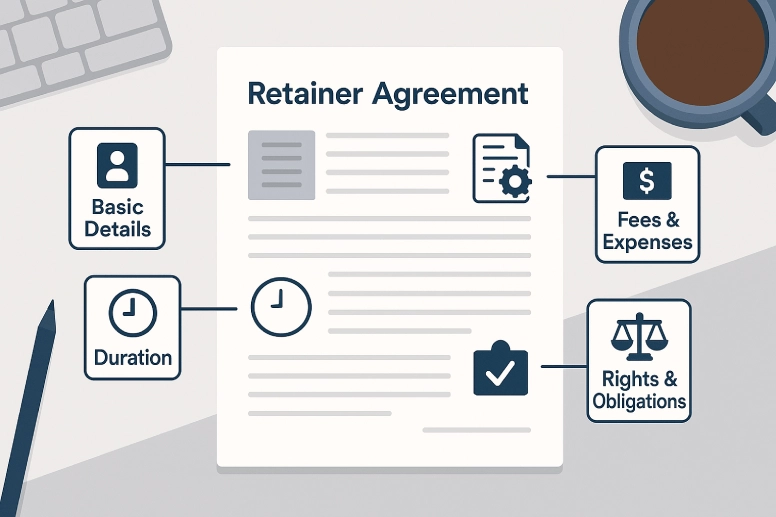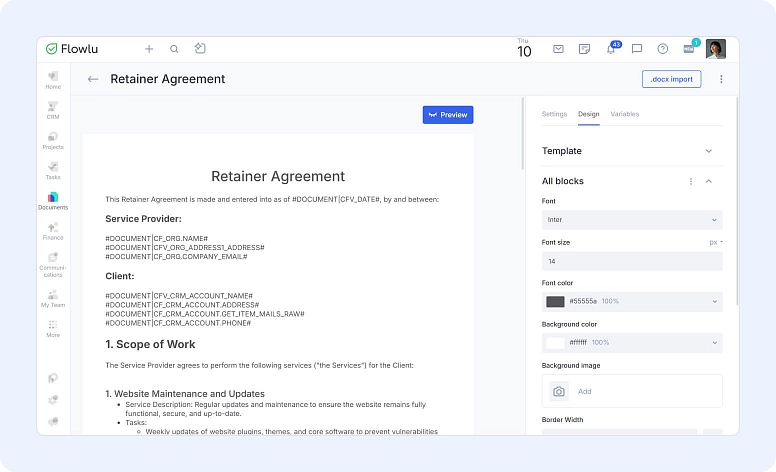What Is a Retainer Agreement: Everything You Need to Know
You can define a retainer agreement as a formal relationship between a service provider and a client. And just like any other formal relationship, it needs to have both roles clarified and formalized to ensure that both parties keep up with the agreement.
Overall speaking, retainer contracts aren’t always the same. In fact, they can vary a lot in both terms of length and form. Ultimately, it depends on the negotiation between the client and the service provider.
Retainer Agreement Meaning
If you’re looking for a simple retainer agreement definition, it’s a legal document that outlines the working relationship between a client and a service provider.
A retainer is typically a fee paid upfront to ensure that the provider is available to deliver services when needed.
In a retainer service contract, you can outline communication methods, ground rules, payment terms, ethical standards, and the expectations and responsibilities of both parties.
It’s also worth noting that retainer agreements aren’t just used by attorneys. You’ll often see them in creative or marketing agencies too. In those cases, the retainer fee is usually billed monthly or quarterly. With legal services, though, the fee is typically paid upfront—almost like a down payment.
In most cases, the retainer fee goes into a dedicated account and stays there until the services are delivered. It acts as both a payment and a guarantee. That said, some agreements may allow for additional charges beyond the retainer. In those situations, any extra payment is no longer considered part of the retainer—it’s usually referred to as a contingency fee.
At a glance, retainer contracts might seem like regular contracts. But there’s one key difference: the service provider—whether a lawyer, agency, or consultant—commits to delivering ongoing services throughout the retainer period.
5 Retainer Agreement Types
#1: Pay-For-Work:
This type of retainer agreement sets a rate that the client needs to pay the agency on a monthly basis. One of the best things about this type of contract is that it’s very flexible. You can either add or deduct working hours. On the negative side, the agency isn’t motivated to work efficiently since payments are based on the time worked, not on the quality of the work delivered.
#2: Pay-For-Access:
This kind of agreement is perfect for agencies that provide packages of services. This is usually the contract a client wants to sign with an agency with whom they have already worked and were satisfied with the services delivered. For example, if you need an agency to do the maintenance of your website, this is the right deal.
One thing to note about this agreement is that anything that doesn’t fit within the scope of the contract carries an additional fee.
#3: Project-Based:
This is the type of agreement that is usually used by creative and marketing agencies to get new clients without worrying about future relationships. In case you’re a freelancer, you may already be used to working this way.
One of the best things about this retainer agreement is that it offers plenty of flexibility. After all, the agency can work on multiple projects and with multiple clients at the same time.
The project-based retainer contract can also be used by lawyers since each project is a case. As soon as it ends, the retainer is paid, and the partnership ends.
#4: Time-Based:
As you can easily understand by its name, this kind of retainer agreement sets the number of hours that the agency will need to work each month. One of the main differences between the pay-for-work contract and this one is that, this time, you’ll bill your client on an hourly basis.
If you need extra flexibility, this is the kind of agreement you should use. On the other hand, this type of agreement may be extremely expensive for the client since it may include additional fees for extra hours.
#5: Lump Sum
This type of retainer agreement is also known as a pay-as-you-go contract since it offers streamlined payments to clients. Simply put, the client needs to pay upfront to the agency for a specific number of hours of work. This is better for the client since they don’t need to pay by the hour, which can easily become very expensive.
Retainer Agreement – What to Include?
When you are looking to write a retainer agreement, the easiest way is to find a template and make the necessary adjustments according to your wants and needs. However, you should make sure to check everything carefully to ensure the contract is compliant with your state laws.
If you’re searching for a faster way to get started, you can create and customize retainer agreements directly in Flowlu using the built-in document builder. It lets you add variables, set up reusable templates, and auto-fill client details to save time.
No matter if you use a template or write your own retainer agreement from scratch, here are the key elements it should always include:
#1: The Basic Details:
All legal documents need to include basic details. These include both parties’ individual names, company names, contact information, and similar.
#2: The Scope of Service Provided:
This is where you need to add exactly what you will deliver to your client. You should be as detailed as possible to avoid future misunderstandings and conflicts.
#3: The Duration of the Service:
If you check the previous retainer contract types, you’ll see that some don’t include an end date—this is because it isn’t required. Nevertheless, you should always include an option for the client to end the agreement earlier if they wish, and clearly outline the consequences.
#4: Fees & Expenses:
The agreement also needs to include all the fees and expenses the client must pay, as well as when they are due. Make sure to include fees or charges for extra work not covered in the contract. This ensures the client will always know what to expect in terms of costs.
#5: Rights & Obligations:
Just like in any other type of contract, you should include the rights and obligations of both parties. In this section, outline how you’ll communicate, each party’s expectations, dispute resolution terms, and anything else relevant.
4 Benefits of Using a Retainer Agreement
#1: Better Relationship With Clients:
One of the main benefits of using retainer agreements is that they can improve your relationship with clients. After all, when you’re working regularly with the same client, you get to know each other better—and you both know what to expect.
#2: Predictable Cash Flow:
If you have a creative or marketing agency, retainer contracts are a great way to ensure a steady income. The same goes for attorneys who secure a minimum upfront payment. In either case, you're paid in advance, so there's no worry about chasing payments.
#3: Predictable Value for Clients:
When a creative or marketing agency has a retainer agreement with a client, the client knows exactly what to expect. This builds a stronger relationship over time and can even turn short-term projects into ongoing business.
#4: Better Planning:
Retainer agreements are also a great tool for better planning. Even if you're juggling multiple projects and clients, it becomes easier to allocate resources efficiently and stay organized.
Bottom Line
There’s no question that a retainer agreement offers both financial and legal protection for both parties. As with any legal document, the more detailed it is, the better—it helps avoid misunderstandings and conflicts down the line.
The best part about retainer contracts is their flexibility. There are different types to suit different needs. The client pays upfront, giving the attorney or agency more stability. In return, the provider commits their expertise to support the client effectively.
To make the process even smoother, Flowlu lets you manage retainer contracts alongside your projects, clients, and invoicing—all in one place. You can track deadlines, monitor billable hours, and keep everything organized without jumping between tools.
No, they aren’t. While they’re a great tool for both parties, you don’t need to use them all the time.
It’s not difficult to understand the meaning of a retainer contract. Simply put, it’s a legal and professional document made between two parties (a client and an attorney, or a client and a creative or marketing agency), where one party agrees to deliver services in exchange for a fee paid upfront.
Retainer agreements should include as many details as possible—such as the amount to be paid, how long the contract will last, and what will be delivered in exchange for the fee.
Yes, fees vary—a lot. As mentioned earlier, there are several different types of retainer agreements, and the fees won’t be the same for all of them. They should also differ depending on whether you’re an attorney or a creative agency entering into an agreement with your client.

















